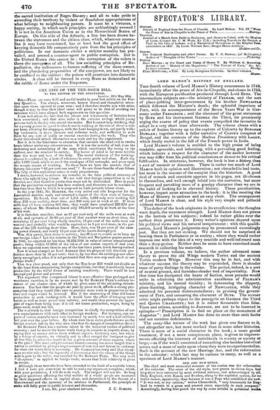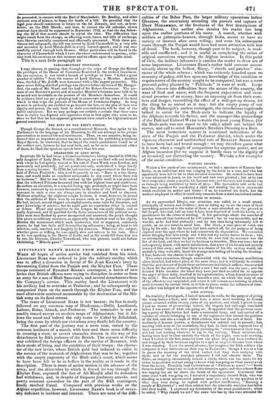SPECTATOR'S LIBRARY.
Hrsroar.
History of England from the Peace of Utrecht. By Lord Mahon. Vol. IV.Prom
the Peace of Aix-la-Chapelle to the Peace of Parts Murray. TRAVELS, Journal of a March from Delhi to Peshawar. and thence to Cobol. with 'he Mission of Lieut..Colonel Sir C. M. Wade. Kt. C.B.; including Travels in the Punjab, a Visit to the City of Lahore, and a Narrative of Operations in the Khyber Pass, undertakeu in 183). By Lieut. William Barr, Bengal Horse Artillery.
Madden and Co.
PorTRT.
The National Bankruptcy and other Poems. By T. B. Browue, (of Mellington,) Author of " Thoughts of the Times." Pickering. FICTION. Heel Moreau; or the Court and Camp of Henry V. By William S. Browning, Author of toe " History of the Huguenots," " The Provost of Paris," &e. Sec. In three volumes (*Irby. Ellen Middleton; a Tale. By Lady Georgians Fullerton. In three volumes.
Maros.
LORD MAHON'S HISTORY OF ENGLAND.
THIS fourth volume of Lord MAHON'S History commences in 1749, immediately after the peace of Aix-la-Chapelle, aud closes in 1763, with the European pacification produced through Lord Burs. The intermediate subjects are—the ministry of PEtuata, and the sort of place-jobbing inter-government by his brother NEwcafems which followed the Minister's death ; the splendid imperious of
PITT, with its accompaniment of the Seven Years War in Ger- many under FREDERICK ; and the dismissal of the great statesman
by BUTE and his instrument GEORGE the Third, for presciently
urging the course of policy that events compelled the favourite to adopt in a very short time afterwards. The volume closes with a
précis of Indian history up to the capture of Calcutta by Suitasan DOWLAH ; together with a fuller narrative of Ctivs's conquest of Bengal, and the contests of the Madras Presidency with LALLY, which finally ended in the fall of the French power in India.
Lord MAHON'S volume is entitled to the high praise of being readable, agreeable, and informing, with a pervading good feeling, which induces a respect for the character of the author however one may differ from his political conclusions or demur to his critical fultilments. In strictness, however, the book is less a history thaw a sort of memoir or discourse. There is rather too much of Lord MAHON both in opinion and illustration ; not obtruded in bad taste, but more in the manner of the essayist than the historian. A good deal of remark and anecdote appears in his pages, not ill-chosen in themselves, and well enough inlaid into the narrative, but more frequent and partaking more of a gossipy character thau we are in the habit of looking for in elevated history. These peculiarities, however, impart some attraction to the book: it is like meeting the Muse of History in undress and an easy chair. The arrangement of Lord MAHON is clear, and his style very simple and pellucid without weakness.
The defect of the book originates in its excellencies : the thoughts want depth, the treatment strength. Lord MAHON does not pierce to the bottom of his subjects ; indeed be rather glides over the surface than penetrates it. Every writer's opinions depend upon his political views and his natural temperament : with this qualifi- cation, Lord MAHON'S judgments may be pronounced exceedingly just. But they are not striking. We should not be surprised at hearing them in Parliament or in society ; where they would rather impress one with the idea of a very sensible and well-informed man than a deep genius. Neither does he seem to have exercised much research in collecting his materials.
In a previous volume, we believe, the author advanced some theory to prove the old Whigs modern Tories and the ancient Tories modern Whigs. However this may be in fact, and with whatever success the theory may be expounded, there is slender trace of party-feelings in the volume. The period, indeed, is a sort of neutral ground, and furnishes slender test of impartiality. Now that time has dissipated the heats of faction, most persons would unite in admitting the administrative excellence of PELHAM'S ministry, and his mental timidity ; in denouncing the slippery, place .hunting, intriguing character of NEWCASTLE, while they admitted his personal disinterestedness; in praising the govern- ment of PITT, and censuring the character of BUTE. The sterner critic might perhaps object to the panegyric on GEORGE the Third and Queen CHARLOTTE; but it is rather favourable than false. Vices and crimes, according to JOHNSON, are not to be inserted in epitaphs—" Proscription is to find no place on the monument of Augustus" : and Lord MAHON has done no more than omit faults and not mention deficiencies.
The essay-like nature of the work has given one feature to it, not altogether new, but more marked than in some other histories. There is more of a social character in the book; a more genial treatment, if not a more conspicuous place, is given to improve- ments affecting the interests of individuals in society or society at large,—as if the world consisted of something else besides historical actors and a mass of units upon whom they were to experimentalize. Such is the account of the new Marriage Act, and the reformation in the calendar : which last may be curious to many, as well as a specimen of Lord MAHON'S manner.
OLD AND NEW STYLE.
The chief and most successful measure of the session was the reformation of the calendar. The error of the old style, now grown to eleven days, had long since been corrected by moat civilized nations, and acknowledged by all. Only England, with Russia and Sweden, clung to the exploded system, for no better reason, apparently, than because it was a Pope who established the new. " It was not, in my opinion," writes Chesterfield, "very honourable for Ewg- land to remain in • gross and avowed error, especially in such company.' Accordingly, having first paved the way by some article. in periodical weebs, • be proceeded, in concert with the Earl of Macclesfield, Dr. Bradley, and other emineot men of science, to frame the heads of a bill. Be provided that the legal year should commence in future on the 1st January, and not, as here- tofore, on the 25th March; and that, to correct the old calendar, eleven nominal days should be suppressed in September 1752, so that the day follow-
• ing the 24 of that month should be styled the 14th. The difficulties that might result from the change, as affecting rents, leases, and bills of exchange, were likewise carefully considered and effectually prevented. With these pro- visions and safeguards, the bill was moved by Lord Chesterfield in a very able and seconded by Lord Macclesfield in a very learned speech ; and it was suc- cessfully carried through both Houma. Other particulars will be found in the character of Chesterfield which I have elsewhere endeavoured to portray, evin- cing both his exertions on this measure audits effects upon the public mind.
This is a neat little paragraph on PARLIAMENTARY PRIVILEGE.
I may observe, in passing, that throughout the reign of George the Second the privileges of the House of Commons flourished in the rankest luxuriance. On one occasion, it was voted a breach of privilege to have " killed a great number of rabbits " from the warren of Lord Galway, a Member. Another time, the fish of Mr. Jolliffe were honoured with a like august protection. The same never-failing shield of privilege was thrown before the trees of Mr. Hunger- ford, the coals of Mr. Ward, and the lead of Sir Robert Grosvenor. The per- sons of one Member's porter and of another Member's footman were held to be as sacred and inviolable as the persons of the Members themselves. It would be neither a brief nor yet a pleasing task to enumerate all the cases of the kind which in that reign the journals of the House of Commons display. So long as men in authority are enabled logo beyond the law, on the plea of their own dignity and power, the only limit to their encroachments will be that of the public endurance. Yet we may perhaps not unfairly conclude that these cases were in reality less flagrant and oppressive than at first sight they seem to be, since we find that far less apparent grievances have raised a far higher and more
general resentment. THE KING ON THE KING'S SPEECH.
Though George the Second, as a constitutional Monarch, thus spoke to his Parliament in the language of his Ministers, he did not attempt in his private conversation to conceal his real sentiments. Thus, on one occasion, being in- formed that an impudent printer was to be punished for publishing a spurious Royal Speech, he answered, that he hoped the man's punishment would be of the mildest sort, because he had read both, and, as far as he understood either of them, he liked the spurious speech better than his own.
CHARACTER OF LORD DOTE.
In private life be had borne a blameless character; having married in 1736 the only daughter of Lady Mary Wortley Montagu, an excellent wife and mother, with whom he had quietly resided at his seat of Caen Wood, near London, and moderately and prudently, yet not parsimoniously, maintained a large family from a scanty income. In 1750, be had received an appointment in the house- hold of Prince Frederick; who used frequently to say, "Bute is a fine showy man, and would make an excellent ambassador in any court where there was no business." But he was little noticed by the public until it was perceived that the widowed Princess honoured him with her highest trust and confidence. So sudden an elevation, in a seacdal-loving age, produced, as might have been foreseen, rumours by no means favourable to the fame of the Princess. Such rumours in such a case are always easy to circulate and hard to disprove. Without attaching the slightest weight to them, it must, however, be owned that the abilities of Bute were by no means such as to justify his rapid rise. Be had, indeed, several elegant accomplishments, some taste for literature, and soma knowledge of science ; but he could gain no reputation either in council or debate. Proud and sensitive in his temper, he was easily elated, and as easily depressed, and ill qualified for the fierce encounters of the political arena. Like most men flushed by power unexpected and unearned, the people thought him prone to arbitrary measures, as apparently the shortest road to his objects. Besides the resentment which such tendencies, real or supposed, commonly create, be bad but little skill in conciliating adherents ; being, at least to his inferiors, cold, reserved, and haughty in his mauners. Whatever the subject, whether grave or trifling, he was equally slow and solemn in his tone. Once as be was speaking in the House of Lords, and as the words fell from him one by one, his kinsman, Charles Townshend, who was present, could not forbear exclaiming, "Minute-guns 1."



























 Previous page
Previous page